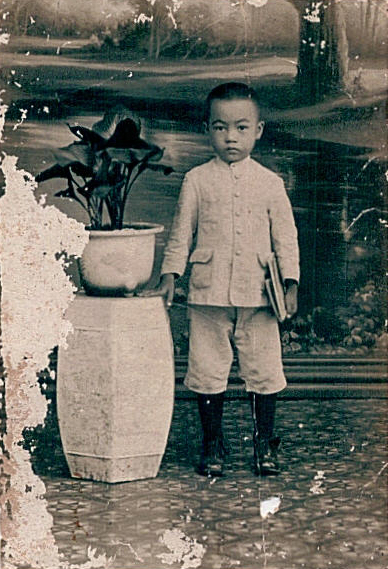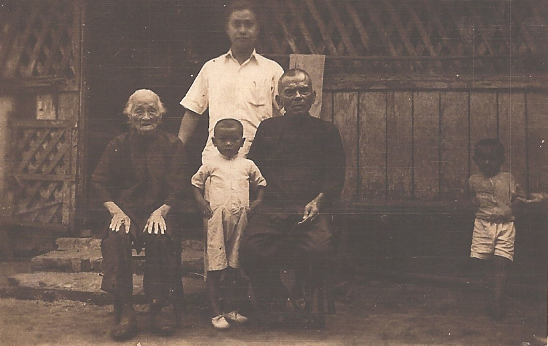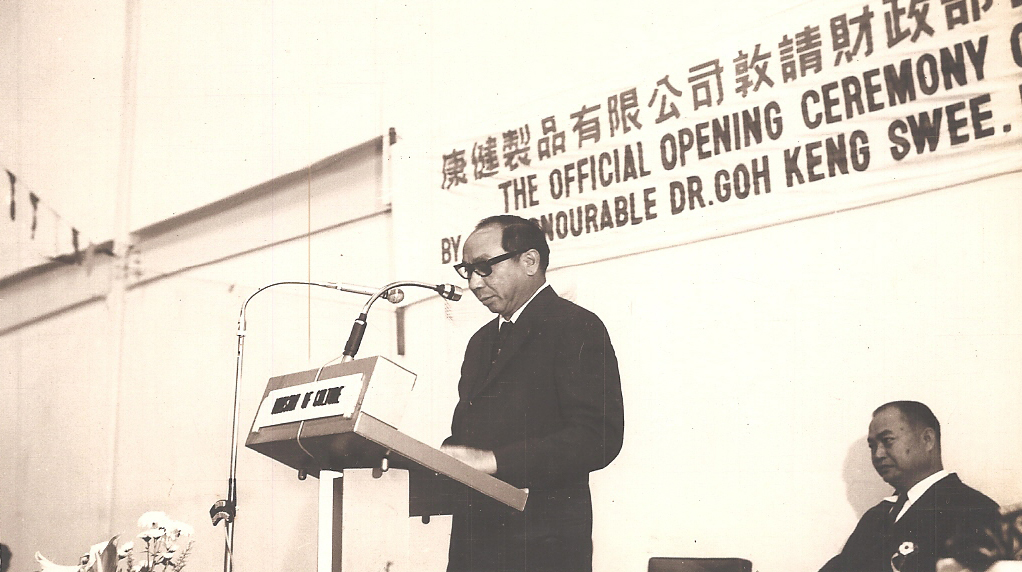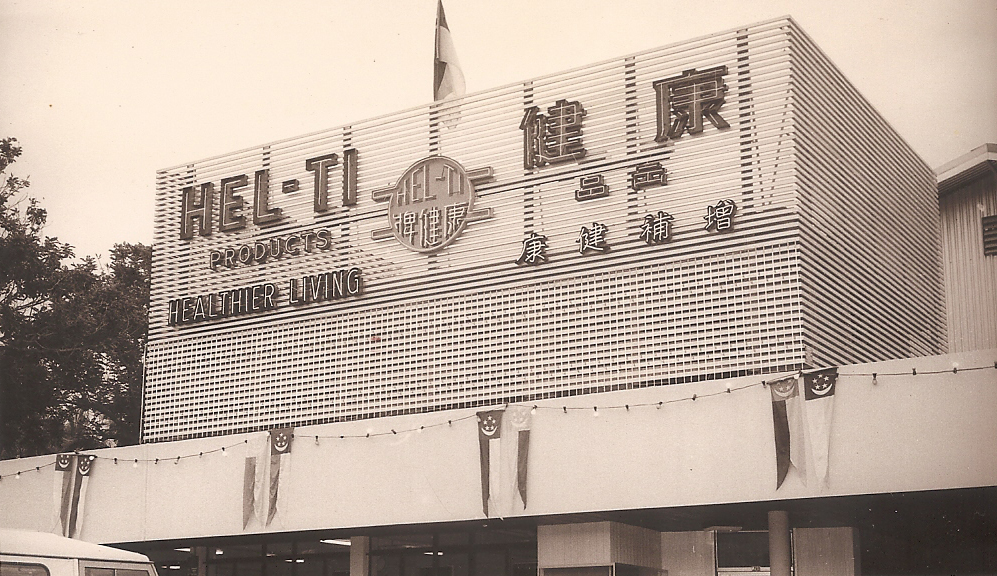
Mr Wan Boo Sow about 5 yrs old.
Wan Boo Sow was born to dirt-poor illiterate immigrants from Hainan. In 1922, his father, a hawker who sold buboh kachang at one cent a bowl, died when he was 4 years old. His mother, a rubber mill labourer, re-married and left him to the care of his paternal uncle.
His adoptive parents reared pigs and chickens, scratching a living from their smallholding in Geylang. As a young lad he collected swill from restaurants, cleaned the sties and sheds, fed the livestock and took the livestock and eggs to the market to sell. This he did in the afternoon, after school in the morning. He walked barefoot the 5 miles to school so as to extend the life of his shoes. In the evenings he supplemented the family's meager income by teaching English to Hainanese cooks and houseboys at the Hoon clan association in Cashin Street as well as cleaning the shoes of a Eurasian family for whom his Uncle by then was working as a cook.
Despite the extreme poverty and hardship, he managed to continue his studies. Most people in his circumstances would have either been denied the opportunity or simply discouraged. Happily his aunt understood the importance of an education and always encouraged him to focus on his studies. In 1925 at age 7 he started schooling at Geylang English Primary School. In 1932 at age 14, he went to Raffles Institution where he was to study the following 4 years. In those days RI was known as the school to which boys from poor families went.

Mr Wan Boo Sow behind adoptive parents in front of their attap home.
After passing the senior Cambridge exams in 1937, his application for the posts of police inspector, hospital orderly and clerk in OCBC Bank came to nought & employment in 1937 was hard to come by and usually jobs were obtained through recommendations. English those days was not spoken by most, and fortunately his fluency in it helped him find employment as a teacher to the children of and as interpreter for a wealthy Hainanese rubber estate owner.
His lucky break came with the help of a Mr. G.V. Allen the Acting Principal of King Edward VII College of Medicine. His cousin who made bi-weekly visits to Mr. Allen's house to cut his hair, showed his senior Cambridge certificate with a request for a position for him. Mr. Allen asked him if he would like to be a doctor to which he replied that he had not the means required. He then suggested pharmacy seeing that he had a credit in chemistry. Mr. Allen sent him to see the Chief Pharmacist at the General Hospital, Mr. Roebuck, who, because there was no vacancy there, in turn sent him to Maynard Pharmacy in Battery Road where his pharmacist friends Mr. Cook & Mr. Chalmers agreed to take him in as an apprentice. All the positions then were held by the British who were the rulers of the day. (He remembered all their names because he never forgot them for their kindness to him). He started work immediately : because of the scarcity of jobs he took it immediately and thus a career as a pharmacist was entirely due to the circumstances of the day and not one of choice.
And so it was that due to the kindness of these gentlemen that he had a proper 'profession'. He took the opportunity to learn all he could about the trade, and worked very hard for he knew the opportunity was invaluable. His innovations were acknowledged by his employer in the form of increased pay. However, because his pay was still low, he continued to hold 2 jobs, continuing with his employment with the Hainanese rubber estate owner so as to augment the family's income for he had become the sole breadwinner. He and his adoptive parents continued to live in the same attap hut in Geylang.
His apprenticeship of 4 years ended in 1941/1942. He built a little seed capital with his earnings by buying and selling medicines which were much sought after: by then the Japanese war had broken out.

May 1943 Mdm Annie Tan & Mr Wan Boo Sow's wedding.
In 1943 he married Annie Tan, the English-educated daughter of a book-keeper. In addition to raising their young and growing family, she helped him in the pharmacy business that he was to start in later years as well as the insecticide business that was to follow not long after. She did so by attending to the pharmacy's customers; she went from house to house with a basket of the insecticide persuading folks to make a purchase. In those days before the advent of supermarkets, house to house sales was the common practice. She continued through the years, later helping with administrative matters in the factory's office. In no small way she gave unstinting support by ensuring a comfortable family life at home as well as helping him in whatever way she could in his business ventures.
He saw himself through King Edward VII College of Medicine with his hard earned income, graduating from it in 1948 in pharmacy when he was already a husband and father of 3 children. His entrepreneurial flair, far-sightedness and diligence during the Japanese occupation enabled him to squirrel away a modest capital. He opened his own pharmacy which he named The London Pharmacy in High Street. Being a qualified pharmacist he started to make his own concoctions such as cough remedies and insecticide.
It was his insecticide that was to become his main business. The people of Chinatown came to buy his insecticide by the basket loads, bringing their own bottles. The word spread. This led to him opening a tiny factory in one of the pre-war houses in Robinson Road followed later by bigger premises in Payar Lebar. These were replaced by a far larger purpose-built one in 875 Bukit Timah Road in the mid-1960s. When Dr. Goh Keng Swee, the Finance Minister at that time, presided over its official opening, it must have been the proudest and happiest moment in his life, the vindication at long last of his long and arduous slog from dire poverty against high odds. That was soon to be followed by another factory in Johore Bahru. His insecticide became the market leader in Malaysia for several long years. It is known as 'Ridsect'. When he retired from the business he handed the running of it to one of his sons, who, over the next 25 years expanded the business and market share beyond his dreams.

1960's Mr Wan showing Dr. Goh Keng Swee around the Ridsect factiory during the official opening.

Dr. Goh Keng Swee presiding over the official opening of Mr Wan Boo Sow's Ridsect factory in Bukit Timah in the 1960's. Mr Wan Boo Sow is seated. Mr Wan Boo Sow's proudest moment.

An earlier Ridsect label

An early Ridsect van

1960's Ridsect factory in Bukit Timah. Hel-ti was a range of pharmaceutical products launched by Mr Wan Boo Sow.
Wan Boo Sow, despite his wealth, lived modestly, eschewing fancy houses and cars. In fact he liked to boast that he was a poor man. He wore the same well-worn simple clothes and had the same watch for most of his life. His words "do not be a slave to possessions" continue to ring true, and he lived by them. He extolled the virtues to his children of thrift and humility by example. He made full use of his senior citizen's concessionary bus pass & his bus guide was dog-earred from being very well used. He would give lessons obliquely by testing his children with questions like "why his shoes are the best buy" - they were rubber or plastic, cost next to nothing, did not wear out easily and were easily washable to boot.
He never forgot the names of the people who had been kind to him because they saw that he needed their help. There were also those who had been unkind to him because he was poor, and shabbily dressed. Because he was very much a deep-thinking man (he was not a man of many words), he drew positive lessons from his life's experiences which he tried to impart to his children. They are very fortunate indeed to have had him as their father for he was and continues to be a positive influence in their lives. During his last days, he imparted words of profound wisdom: "If you always think only of yourself, you will always be unhappy".
"If you always think only of yourself, you will always be unhappy".
Because of those desperate early years, he understood first-hand what it was like to have to struggle in life and this made him compassionate and generous towards people in like circumstances. It is in this spirit of compassion, as well as to honour the man who was their father that his children created The Wan Boo Sow Charity Charity Fund Limited through which they give to deserving charitable causes in his name and in memory of him and their mother Annie Tan.